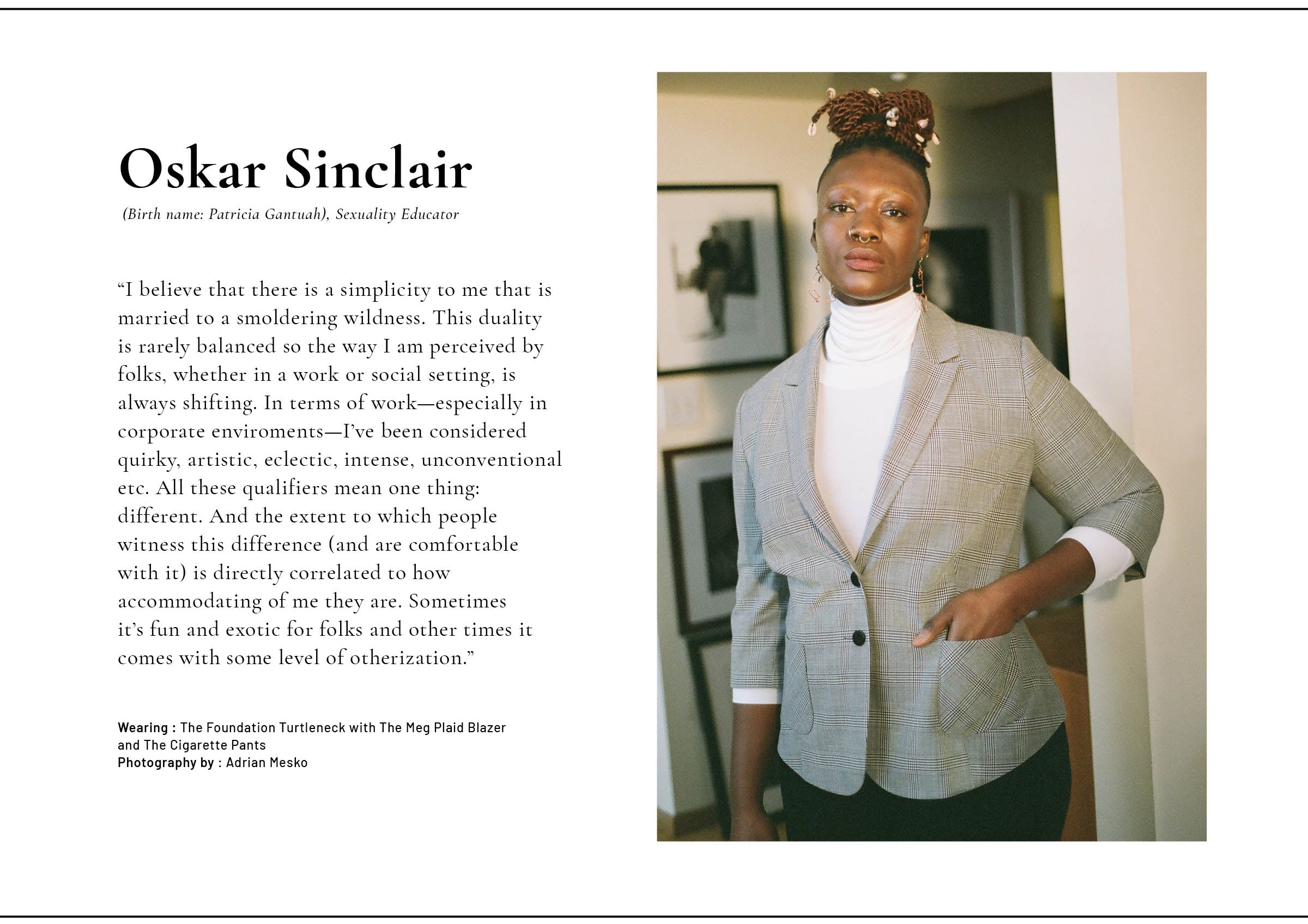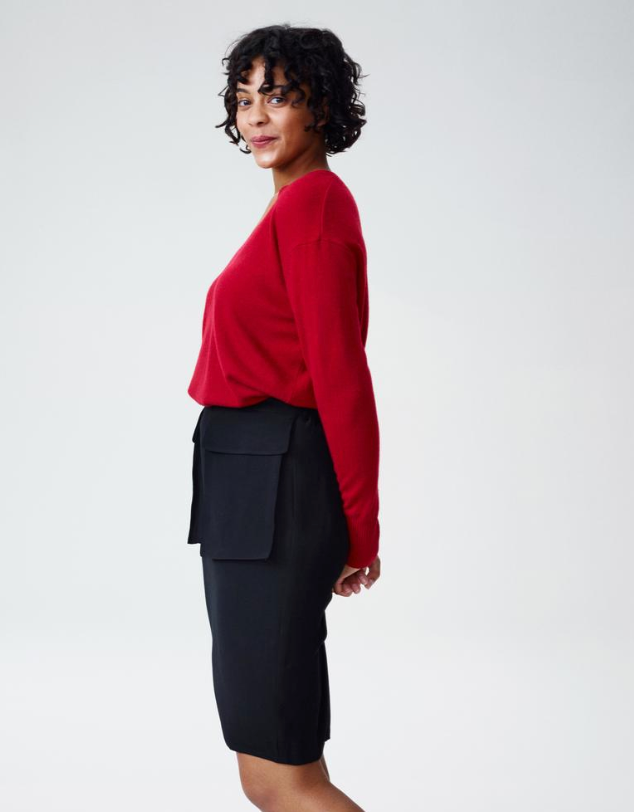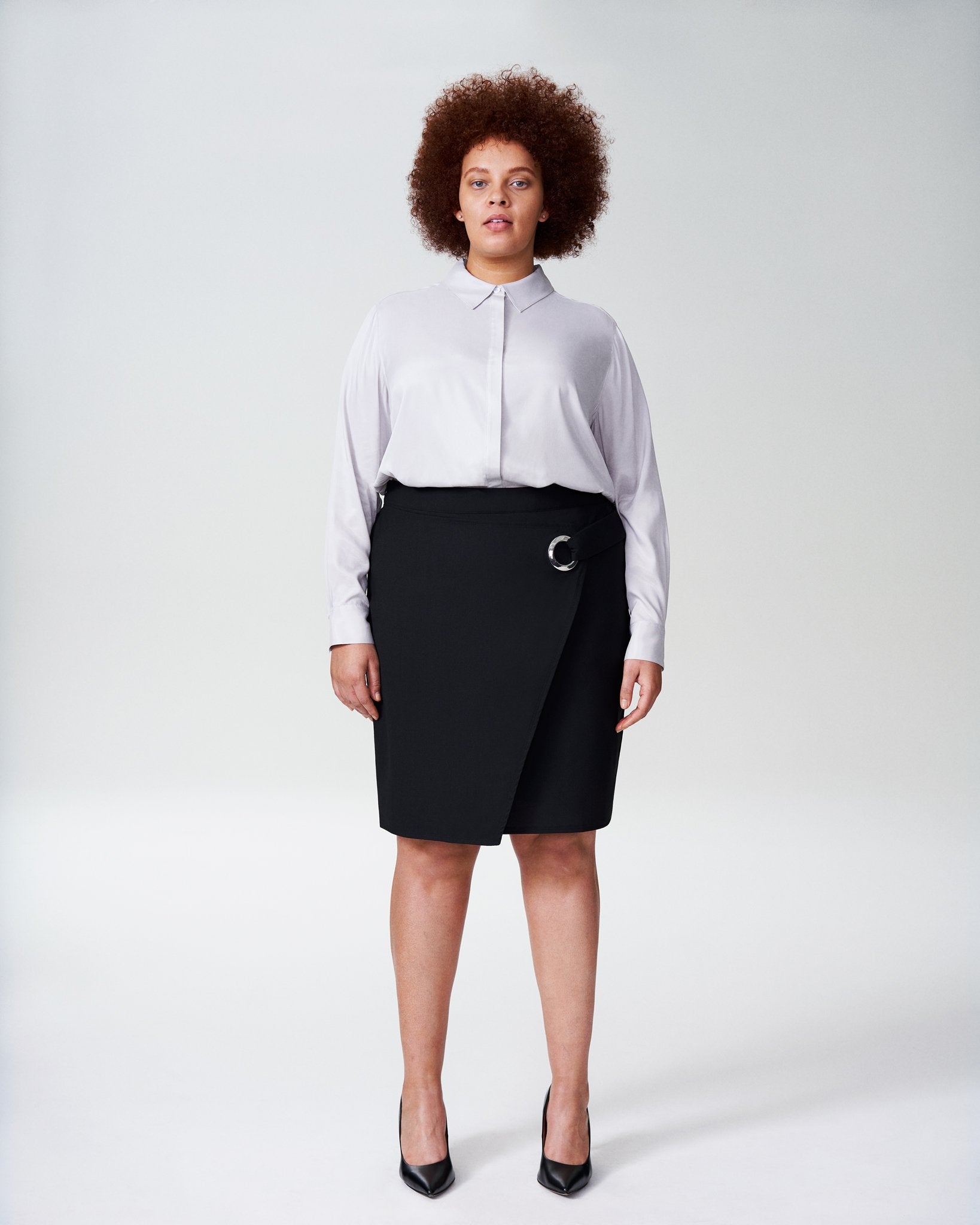
Behind the Shoot: Workwear Comes To Life
We asked the subjects of our shoot to step out from in front of the camera and reveal what we don’t see… From style perspectives to industry ideas, read their thoughts, opinions, inspirations, advice, and more.
An Interview with ( US )
What advice would you give your younger self (personally or professionally)?
Experiences may be framing your identity but from moment to moment you get to decide who you are. Be gentle. You are doing the best you can with what you have. The glow up is going to be real and will only be limited by your ability to imagine your final form.
P.S. There is no final form.
P.P.S. Don’t waste your time being on the pre-med or pharmacy track in college.
How do you use clothing to construct, or inform, your identity?
I call myself a genderqueer femmeborg. What started off as a joke to critique the limitation of people’s ability to sometimes grasp my queerness evolved into being an actual identity I hold in high regard. This identity is automated, sensual, and off the wall, but also has to offer a central simplicity for my poor Capricorn heart. With this in mind, when I pick clothing, I am looking for everyday wear that by itself doesn’t stand out, but when paired with other pieces makes you think, “They look nice!” I’m still trying to make sense of what this looks like in terms of party/event spaces especially since queer kinfolk are always serving looks and one can easily feel as if they aren’t doing enough.
Does that impact your personal presentation in terms of being a working model?
It’s interesting because even though I’m gender nonconforming (GNC), I am often read as femme and/or as a cisgender woman. While I have mixed feelings about this, I am inherently happy with my aesthetic and its constant evolution. I also acknowledge that the discoveries modeling has allowed (and hopefully will continue to facilitate) stimulate my eclecticism. Currently, I am going through the motions of deciding whether or not to go on testosterone treatment (as a way of aligning my physical features with my understanding of my gender) and have stressed myself out quite a bit wondering if this decision will negatively impact my ability to grow as a model. I’m ultimately going to go for it and will definitely have to revisit this question. The hope generally is that I become a stronger model not in spite of this transition, but because of it.
How do you translate the idea of workwear?
As someone whose interactions are influenced by people’s perceptions of womanhood, there has always been a desire to look/be powerful especially in the work setting. Power in the sense that women go through so much just to barely have a seat at the table, so if I am representing women, then best believe that I’m pulling up my own seat and ready to take what’s owed me—not what people may think I deserve. Be unsettled, be intimidated, but do right by me. And this starts with what I wear because—as a model, an employee, an emerging artist, Oskar—when I know I look good, the persona follows.
How do you think the fashion industry is doing re: inclusivity & representation?
I saw something on social media that said something along the lines of, ”fat women making space for themselves is what made space for everyone else.” The body positivity movement was birthed by fat women doing the hard work of unpacking the harm done to us. The fashion industry picked the aspects of said movement that was easy to commodify and went to town feeding us second-hand allyship; and this is in regard to fatness, gender, and queerness. Is there a genuine commitment to understand the populations they’re working with and providing for? There’s the expectation that I be thankful (and to an extent I am) but what am I actually thankful for? Slowly and painfully, unrealistic expectations are being replaced, but I needed them erased decades ago! We needed them nonexistent to begin with! I am not impressed. That said, I will always take time to shed happy, snotty tears whenever models outside of the established oligarchy get to shine! 10 years from now, I want bodies and identities normalized so authentically that when someone says that they’re a model, there’s no suspension of disbelief.
What advice would you give your younger self (personally or professionally)?
Stop comparing yourself to others and focus on yourself.
Tell US a little bit more about what you’re studying. Why is it important?
I'm studying political science. I think politics has always interested me, but when the 2016 election happened, I felt like I couldn't just sit around and wait for things to change. I think that more young people should be involved in politics and by starting early we can also have our concerns be taken into account.
As a student and a model, how does your style change between your two worlds?
They definitely intersect. I don't let being a student stop me from dressing the way that I want to. I get looks for not wearing the typical hoodie, leggings, and Birkenstocks to class, but I don't care. I'll be a little extra because that’s what I feel comfortable in.
How do you think the fashion industry is doing re: inclusivity & representation?
I think we are slowly getting there. There is a real issue with brands promoting diversity and inclusivity for marketing purposes, but not being actually diverse in the corporate setting. What I would love to see is diversity and inclusivity represented in all levels of the industry.
What advice would you give your younger self (personally or professionally)?
"Hey girl hey" and “be patient… your stubbornness is helping you build a whole career and influencing so many people around the world."
How does social media inform your personal style?
I didn’t have options, even having to DIY, and social media was only just becoming a thing when I was growing up. So, yes, social media has helped inspire and showcase my style, but previously all I had was fashion books and magazines. Interestingly, Ashley and Mary-Kate Olsen were my style icons at one point - then all the black women from Girlfriends - and now I have a wealth of inspiration from so many places.
Given that you don’t work in a corporate setting with a dress code, how do you translate the idea of workwear?
With workwear, I love wrap details, so I own a lot of smart and simple wrap dresses, which can be paired with trainers, heels or cute loafers/shoes. It can make me feel less formal, no matter the season and time of day.
How do you think the fashion industry is doing re: inclusivity & representation?
I feel that the fashion industry is still lacking, and I could go as far as to say it’s still negligent. Particularly, in its sensitivity to understanding the real issues needed to make the industry more inclusive. I believe it starts with the people being recruited as part of the teams within fashion houses, companies, stories and other creative projects. They can at least look like the people being targeted, as a means of representation.
What advice would you give your younger self (personally or professionally)?
I would tell myself that my clothes should be an extension of myself, not an extension of someone that I want to be.
Given that you don’t work in a corporate setting with a dress code, how do you translate the idea of workwear in your personal style?
I’ve always had a lot of fun incorporating workwear into my style. Blazers or a nice pair of black trousers are my go-to’s a lot of the time. They give me instant confidence and empowerment.
As a student and a model, how does your style change between your two worlds?
My style stays consistent in the two worlds. However, when I first began modeling and going to castings, I would often try particularly hard to match the style of the other women. I was a little intimidated at certain ones where there wasn’t as much diversity and thought that I would have a better chance if I wore similar clothes to the rest. That idea was quickly put to rest as I went to more and more castings where there was more diversity and where I was inspired to present myself as I am because my clothes were an extension of who I am and I don’t want to be cast as someone I am not.
How do you think the fashion industry is doing re: inclusivity & representation? What would you like to see 10 years from now?
I think it’s doing better, but still has a long way to go. There are so many great brands that are hiring models of all shapes and sizes and ethnicities. I hope that in the future, the gap diminishes that the industry holds between a model and someone who is not a model.























